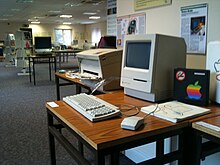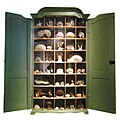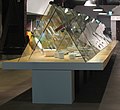Portal:Museums
The Museums Portal
A museum (/mjuːˈziːəm/ mew-ZEE-əm) is an institution dedicated to displaying and/or preserving culturally or scientifically significant objects. Many museums have exhibitions of these objects on public display, and some have private collections that are used by researchers and specialists. Compared to a library, a museum hosts a much wider range of objects and usually focus around a specific theme such as the arts, science, natural history, local history, and other topics. Public museums that host exhibitions and interactive demonstrations are often considered to be tourist attractions, and many museums attract large numbers of visitors from outside their host country, with the most visited museums in the world regularly attracting millions of visitors annually.
Since the establishment of the earliest known museum in ancient times, museums have been associated with academia and the preservation of rare items. Museums originated as private collections of interesting items, and not until much later did the emphasis on educating the public take root. (Full article...)
Selected museum
The National Gallery of Art is an art museum in Washington, D.C., United States, located on the National Mall, between 3rd and 9th Streets, at Constitution Avenue NW. Open to the public and free of charge, the museum was privately established in 1937 for the American people by a joint resolution of the United States Congress. Andrew W. Mellon donated a substantial art collection and funds for construction. The core collection includes major works of art donated by Paul Mellon, Ailsa Mellon Bruce, Lessing J. Rosenwald, Samuel Henry Kress, Rush Harrison Kress, Peter Arrell Browne Widener, Joseph E. Widener, and Chester Dale. The Gallery's collection of paintings, drawings, prints, photographs, sculpture, medals, and decorative arts traces the development of Western art from the Middle Ages to the present, including the only painting by Leonardo da Vinci in the Americas and the largest mobile created by Alexander Calder.
The Gallery's campus includes the original neoclassical West Building designed by John Russell Pope, which is linked underground to the modernist East Building, designed by I. M. Pei, and is next to the 6.1-acre (25,000 m2) Sculpture Garden. The Gallery often presents temporary special exhibitions spanning the world and the history of art. It is one of the largest museums in North America. Attendance rose to nearly 3.3 million visitors in 2022, making it first among U.S. art museums, and third on the list of most-visited museums in the United States. Of the top three art museums in the United States by annual visitors, it is the only one that has no admission fee. (Full article...)
Selected interior image
Selected general article

In conservation, library and archival science, preservation is a set of preventive conservation activities aimed at prolonging the life of a record, book, or object while making as few changes as possible. Preservation activities vary widely and may include monitoring the condition of items, maintaining the temperature and humidity in collection storage areas, writing a plan in case of emergencies, digitizing items, writing relevant metadata, and increasing accessibility. Preservation, in this definition, is practiced in a library or an archive by a conservator, librarian, archivist, or other professional when they perceive a collection or record is in need of maintenance.
Preservation should be distinguished from interventive conservation and restoration, which refers to the treatment and repair of individual items to slow the process of decay, or restore them to a usable state. "Preventive conservation" is used interchangeably with "preservation". (Full article...)
Did you know...
- ... that museum director Alena Aladava rebuilt the Belarusian national art collection in the aftermath of the Second World War?
- ... that a pair of sealskin-covered high heels by Inuk designer Nicole Camphaug are held in the Bata Shoe Museum of Toronto?
- ... that State Auto Mutual's life-size nativity scene was donated to the Museum of Catholic Art and History in 2023 for display at St. Joseph Cathedral?
- ... that Hasanpaşa Gasworks escaped its demolition through the resistance of local residents, became a festival venue for a time and was finally transformed into a museum after redevelopment?
- ... that the Springfield Science Museum is home to the oldest operating projection planetarium in the United States?
- ... that curator Nina Tonga is the first Pasifika person to be a contemporary art curator at Te Papa, the national museum of New Zealand?
Get involved
For editor resources and to collaborate with other editors on improving Wikipedia's Museums-related articles, see WikiProject Museums.
Selected exterior image
Selected type of museum

A computer museum is devoted to the study of historic computer hardware and software, where a "museum" is a "permanent institution in the service of society and of its development, open to the public, which acquires, conserves, researches, communicates, and exhibits the tangible and intangible heritage of humanity and its environment, for the purposes of education, study, and enjoyment", as defined by the International Council of Museums.
Some computer museums exist within larger institutions, such as the Science Museum in London, United Kingdom; and the Deutsches Museum in Munich, Germany. Others are dedicated specifically to computing, such as:
- the Computer History Museum in Mountain View, California, United States.
- the American Computer & Robotics Museum in Bozeman, Montana, United States.
- The National Museum of Computing at Bletchley Park, United Kingdom.
- The Centre for Computing History in Cambridge, United Kingdom
- the Nexon Computer Museum in Jeju Province. South Korea. (Full article...)
In the news
- 31 May 2024 – Israel–Hamas war protests
- Pro-Palestinian protesters occupy parts of the Brooklyn Museum in New York City, New York, U.S. (Reuters)
- 12 May 2024 –
- Forty-nine Vatican Museums employees start an unprecedented labor dispute over unfair and poor working conditions against the Vatican's Pontifical Commission. (Reuters)
- 6 May 2024 –
- The 2024 Met Gala takes place at the Metropolitan Museum of Art in New York City with the theme "The Garden of Time", celebrating the Met's exhibit Sleeping Beauties: Reawakening Fashion. (Vanity Fair)
Subcategories
Subtopics
Lists
- Museums
- Most visited museums (by region)
- Art museums: most visited, largest
Types
- Art museum
- Agricultural museum
- Archaeology museum
- Architecture museum
- Artillery museum
- Aviation museum
- Biographical museum
- Cabinet of curiosities
- Ceramics museum
- Children's museum
- Community museum
- Computer museum
- Design museum
- Dime museum
- Ecomuseum
- Economuseum
- Ethnographic village
- Farm museum
- Fashion museum
- Folk museum
- Food museum
- Green museum
- Hair museum
- Hall of Memory
- Heritage centre
- Historic house museum
- Human rights museum
- Imaginarium
- Interpretation centre
- Jewish museum
- Lapidarium
- Lighthouse museum
- Living museum
- Local museum
- Maritime museum
- Migration museum
- Mobile museum
- Museum ship
- National history museum
- Natural history museum
- Open-air museum
- Palace museum
- Postal museum
- Prefectural museum
- Print room
- Private museum
- Regimental museum
- Schatzkammer
- Science fiction libraries and museums
- Science museum
- Sex museum
- Sculpture garden
- Technology museum
- Textile museum
- Torture museum
- Toy museum
- Transport museum (list)
- University museum
- Virtual museum
- Wax museum
- Writer's home
Related
Associated Wikimedia
The following Wikimedia Foundation sister projects provide more on this subject:
-
Commons
Free media repository -
Wikibooks
Free textbooks and manuals -
Wikidata
Free knowledge base -
Wikinews
Free-content news -
Wikiquote
Collection of quotations -
Wikisource
Free-content library -
Wikiversity
Free learning tools -
Wiktionary
Dictionary and thesaurus







































































